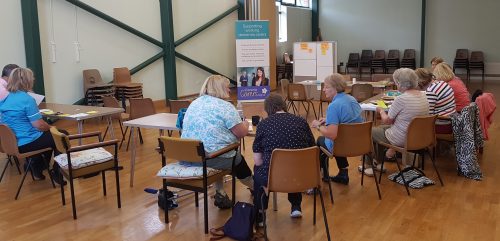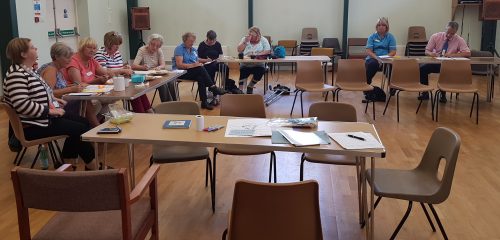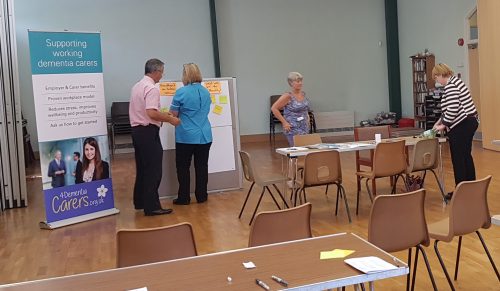Newton Abbot Dementia Carer Network group
The Newton Abbot Dementia Carer Network has been running since April 2018. For anyone who has been affected by dementia. It doesn’t matter if this is in the past or is happening now. You don’t have to be the main carer. You may even want to come to be able to better support someone else who is caring for a person with dementia.
Time and place
Venue changed from Jan 2019: Middleton Room, St Paul’s Church, Devon Square, Newton Abbot, TQ12 2HN. Free parking – get a permit from Mary at the start.
When: Newton Abbot Dementia Carer Network Meetings usually take place on the first Thursday of the month. Please check on the website before coming, just in case there has been a change.
Time: The meeting starts at 1400 and finishes at 1530.
Format
This Dementia Carer Network is an informal gathering. Meet others who have experienced dementia from a carer perspective and join the support network. Your own health and well-being is important to us. Understanding more about dementia can help you to cope. Tell us what you need to know more about. If you think it might help you come along and give it a try. If you can get here you are welcome. There is no charge for attending. Free refreshments including cake!

Making a difference together
Mary
The sessions are run by Mary Sherwood who has had personal experience and is now raising awareness of and support for dementia carers in Newton Abbot. This is Mary’s contribution to the Teignbridge Dementia Action Alliance – TDAA.
Example
Each month sees new members, but we are always keen to welcome more.

Keep it simple
We started with a practical exercise about communication. Learning how to simplify language when speaking to a person with dementia is a useful tool. We are normally taught to use open questioning. A person with dementia will find this very complex and exhausting. Offering choices and participation in decision making promotes well-being. Using simple language enables the person with dementia to fully participate and feel respected. Closed questions requiring a single or two-word answer are much easier to respond to. We must understand the value of silence. This allows the person with dementia to think through the question and their answer at their own pace. If we interrupt their train of thought it can be very damaging to them.
Exercises
We ran through some practical examples of malignant social psychology. By discussing real life situations we can understand better how our actions or behaviour can adversely affect a person with dementia. Seeing the things which can lead to ill-being helps us to put ourselves in the position of a person with dementia. Simple changes in language, body language or behaviour can have a huge positive effect. Tom Kitwood believes this can lead to rementia! After all the person with dementia is likely to be dealing more with peoples’ attitudes and a poor environment than the dementia itself. Removing any unnecessary extra grief is the least we can do for them.
What I will do differently

understanding social impact
- Really engage with people with dementia – i.e:.join in/go with the flow
- Have more patience
- I will listen more and agree with what he says
- I learnt from examples of behaviour
- Changing the way I think about my language I use
- Not to be judgemental
- Listen to their needs more
- Be in the moment
- Talking to people in a more informed and sensitive way
Feedback on the session
- Today’s session was good and a great help. I am glad I came.
- Information I can pass on to family members.
- The behaviours section was very interesting.
- Helpful session about being careful not to contradict people with dementia.
- Very helpful – not what I expected. Thought I would be asked to help – not that it would help me!
- Very informative
- It is good to be reminded how to deal with dementia.
- Confirms my previous work
- Still need to know early signs. Session tends to talk about more advanced situations.
If you are interested in finding out more why not contact us.
